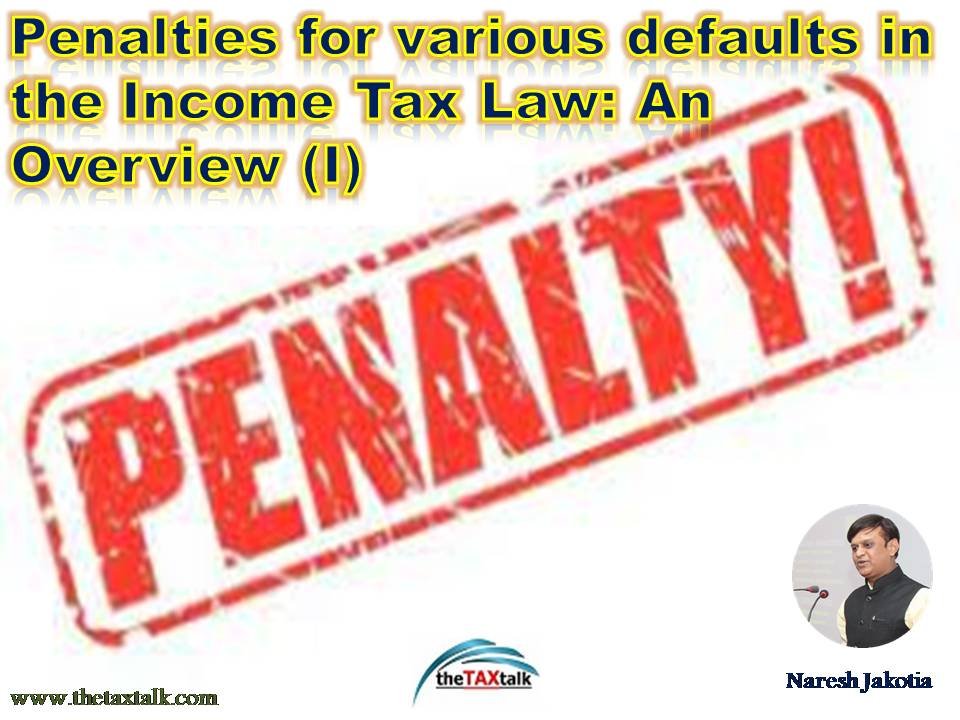![]()
Penalties for various defaults in the Income Tax Law: An Overview (I)
No law can exist without the penal provision. To ensure that the taxpayer does not default in paying taxes or disclosing the information, there are several penalties prescribed under the Income Tax Law. Some of the penalties are mandatory whereas few are at the discretion of the tax authorities. With each passing year, penal provisions are getting stricter & discretionary powers of authorities are shrinking. Let us know some of the most common penal provisions in the Income Tax Act-1961.
- Penaltyfor underreporting and misreporting of income:
Many times a taxpayer may try to reduce his tax liability by underreporting or misreporting of income. In such a case, penalty may be levied U/s 270A. Penalty amount in such a case shall be 50% of the tax payable on under-reported income. However, in a case where under-reporting of income results from the misreporting of income then the taxpayer shall be liable for penalty @ 200% of the tax payable on such misreported income. In short, the cost of penalty would be double the amount of legitimate tax.
For levy of penalty, the following cases will be considered as misreporting of income: - Misrepresentationor suppression of facts.
- Failureto record investments in the books of account.
- Claimof expenditure not substantiated by any evidence.
- Recordingof any false entry in the books of account.
- Failureto record any receipt in books of account having a bearing on total income.
- Failure to report any international transaction or any transaction deemed to be aninternational transaction or any specified domestic transaction, to which the provisions of Chapter X apply.
- Penaltyin case of Income Tax Raids [Search Case]:
If the undisclosed income is found in the income tax raids conducted by income tax department after 16.12.2016 then the penalty is leviable U/s 271AAB as under:
a) 30% of undisclosed income if taxpayer admits the undisclosed income; substantiates the manner in which it was derived and pays the tax along with interest while filing income tax return of the year to which such undisclosed income pertains.
b) 60% of undisclosed income if it is not covered by above case. - Penalty incase of income from undisclosed sources:
If during the course of the assessment, income tax officer make any addition U/s 68, 69, 69A, 69B, 69C or 69D (all this sections pertains to undisclosed income, investment, expenditure, money etc) then the penalty is applicable U/s 271AAC @ 10% of the tax payable under section 115BBE. - Penalty to reply or make submission:
If the taxpayer fails to comply with notices issued under various sections of the Income Tax Act then penalty is applicable U/s 272A@ Rs. 10,000 for each failure. - Feefor default in furnishing return of income:
Taxpayers who are required to file the income tax return fail to file it are liable for the late fee of Rs. 5,000 if return has been furnished after the due date prescribed U/s 139(1). However, it shall be Rs. 1,000 only if the total income of does not exceed Rs. 5 lakh. The late fee is not at the discretion of the tax authorities and is mandatory in nature. - Penalty for failure to keep, maintain, or retain books of account, documents, etc., asrequired under section 44AA:
Wherever the taxpayer is required to maintain the books of accounts fails to maintain it then such taxpayer shall be liable to pay penalty u/s 271A of Rs. 25,000. - Penaltyfor ‘False Entry’ in the Books of Account:
The Finance Act 2020 has introduced a new section 271AAD to provide for a levy of penalty if during any income tax proceedings it is found in the books of accounts maintained by the taxpayers that there is:
a) A false entry; or
b) Any entry relevant for computation of total income of such a person has been omitted to evade tax liability.
The penalty amount shall be equal to the aggregate amount of false entries or omitted entry.
Further, the person (may be an accountant, tax consultants, business facilitator, broker, etc) who guides or abets such false entries may also be liable for a penalty of an equivalent amount.
For the purpose of section 271AAD, the false entry includes use or intention to use:
a) Forged or falsified documents such as a false invoice or, in general, a false piece of documentary evidence.
b) Invoice in respect of supply or receipt of goods or services or both issued by the person or any other person without actual supply or receipt of such goods or services or both or
c) Invoice in respect of supply or receipt of goods or services or both to or from a person who do not exist.
- Failure to file Statement of Donation or issue donation certificate:
Now, every trust who are registered U/s 80G are required to file the Statement of Donation received. Failure to file such a statement within the due date attracts a fee @ Rs. 200 per day. However, the fee cannot exceed the amount in respect of which the failure hasoccurred. Section 271K further empowers the Assessing Officer to levy a penalty of Rs. 10,000 to Rs. 1 lakh if such trusts fail to furnish the statement or fails to furnish a certificate. - Failure to getaccounts audited or furnish a report of audit as required under section 44AB:
If taxpayers who are required to get their books of accounts audited U/s 44AB fails to do so then they are liable for penalty U/s 271B which can be ½% of the total turnover or Rs. 1,50,000, whichever is less.
These are some of the most common penal provisions which are used by the tax authorities for ensuring compliance with the tax laws. We will discuss a few more in the next issue of The Tax Talk.
[Readers may forward their feedback & queries at taxtalknew@gmail.com. Other articles & response to queries are available at www.theTAXtalk.com]

